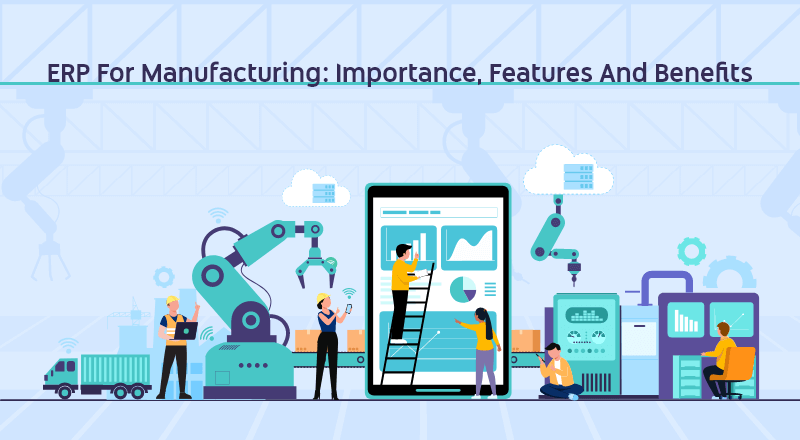Erp for manufacturing: importance, features and benefits
ERP software is an essential tool for the manufacturing industry, bringing a myriad of benefits that streamline processes and enhance overall efficiency. Let's explore how this revolutionary technology drives growth and optimizes operations.
Benefits of ERP Software for the Manufacturing Industry:
Improved Production Planning and Inventory Management:
One of the significant advantages of implementing ERP software in the manufacturing sector is enhanced production planning. The system integrates various departments, such as procurement, production, and inventory management, enabling real-time visibility and control over the entire production process.
With accurate demand forecasting and inventory tracking, manufacturers can reduce stock outs, eliminate excess inventory, and optimize the supply chain. This streamlined approach minimizes production costs, maximizes resource utilization, and ensures on-time delivery to customers.
Enhanced Quality Control:

Quality control is critical in the manufacturing industry to deliver defect-free products and maintain customer satisfaction. ERP software offers robust quality management modules that monitor and track every stage of production, from raw material procurement to final product inspection.
The system generates real-time quality reports, alerts, and notifications, allowing manufacturers to identify and rectify any deviations or non-conformities promptly. With this proactive approach, companies can uphold high-quality standards, meet regulatory requirements, and minimize the risk of product recalls.
Efficient Resource Management:
Optimal resource management is vital for manufacturers to allocate their workforce, materials, and equipment effectively. ERP software provides a comprehensive overview of resource availability, facilitating better planning and scheduling.
By identifying bottlenecks and optimizing resource allocation, manufacturers can minimize downtime, increase productivity, and reduce costs. Real-time data and analytics enable quick decision-making, allowing businesses to respond promptly to market demands and stay ahead of competitors.
Streamlined Financial Operations:
Financial management is another critical aspect of ERP software in the manufacturing industry. The system integrates financial modules, including accounts receivable, accounts payable, and general ledger, ensuring accurate financial reporting and transparency.
Manufacturers can effortlessly track costs, monitor revenues, and manage their budgets effectively. With streamlined invoicing, billing, and payment processes, businesses can improve cash flow management and reduce financial risks.
Enabling Regulatory Compliance:
Regulatory compliance is a top priority for manufacturers, as non-compliance can lead to severe penalties and reputational damage. ERP software helps businesses adhere to industry-specific regulations and standards by providing comprehensive documentation, audit trails, and reporting capabilities.
The system simplifies compliance with standards such as ISO, FDA, and other regulatory bodies, ensuring that manufacturers meet the necessary requirements consistently.
In conclusion, implementing ERP software in the manufacturing industry brings a multitude of benefits, including improved production planning, enhanced quality control, efficient resource management, streamlined financial operations, and regulatory compliance. By harnessing the power of this transformative technology, manufacturers can drive growth, achieve operational excellence, and deliver exceptional products to their customers.